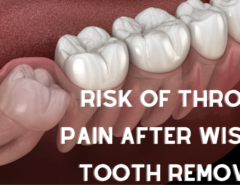If you’ve recently had your wisdom teeth removed, you may be experiencing a lot of pain and discomfort in your mouth, which can result in additional pain in your head and throat, too. If you have a sore throat after wisdom teeth removal, the source of the problem might come from one of these six things…
Blocked sinuses
One of the most common causes of a sore throat is sinus drainage. When your sinuses are blocked, the mucus can build up and cause pressure in your sinuses. This pressure can cause pain in your throat and make it difficult to swallow. There are several things you can do to clear your sinuses and reduce the pain in your throat.
Nasal irrigation with saline or salt water will wash away any accumulated mucus. Taking an over-the-counter decongestant like Sudafed can also help unblock your sinuses. Be sure to drink plenty of fluids to keep yourself hydrated while trying these methods!
An infected tooth
One of the most common causes of a sore throat after wisdom teeth removal is an infected tooth. If you have an infected tooth, you may experience symptoms such as pain, swelling, and redness. You may also have a fever. Treatment for an infected tooth includes antibiotics to clear the infection and pain relief to help with the pain.
Antibiotics can be taken in pill form or applied directly into the mouth in liquid form. Pain relief medication is available over-the-counter or by prescription from your dentist or doctor. Analgesics that contain aspirin should not be used by people who are taking blood thinners such as warfarin (Coumadin) because it increases the risk of bleeding.
Throat pain from swollen lymph nodes
One common cause of a sore throat post-wisdom teeth removal is swollen lymph nodes. This can happen when the body is fighting off an infection, such as a cold or the flu. The good news is that swollen lymph nodes usually go away on their own within a week or two. In the meantime, try these home remedies to ease your discomfort:
- Gargle with warm salt water several times a day.
- Drink plenty of fluids to stay hydrated.
- Loosen tight clothing.
- Try over-the-counter pain medication like ibuprofen or acetaminophen.
- Take acetaminophen before bedtime to help you sleep better at night, if needed.
Strep throat
One of the most common causes of a sore throat is strep throat. This is a bacterial infection that can cause symptoms like a fever, body aches, and white patches on your tonsils. If you suspect you have strep throat, it’s important to see a doctor right away so you can start treatment. The earlier you start antibiotics, the more likely they are to work. Symptoms usually go away within 7-10 days with treatment.
Allergies
Allergies are a common cause of a sore throat. If you have allergies, you may be reacting to something in your environment, such as pollen or pet dander. Over-the-counter antihistamines can help relieve symptoms. If your sore throat is severe, you may need a prescription-strength antihistamine. In addition, allergy shots can help you get over the allergy that’s causing the reaction. Your doctor may also prescribe a steroid nasal spray if there’s an infection involved in your reaction.
Burning sensation
One common symptom of a wisdom tooth infection is a burning sensation. This can be caused by the bacteria in the infection irritating the surrounding tissues. The best way to combat this is to rinse your mouth with warm salt water several times a day. You can also take over-the-counter pain medication to help relieve the discomfort.
Also Read:- How to Sleep After Wisdom Teeth Removal?
FAQ’s | Sore throat after wisdom teeth removal
How do you get rid of a sore throat after wisdom teeth removal?
- Gargle with warm salt water. This will help reduce swelling and pain in your throat. Take over-the-counter pain medication. Ibuprofen or acetaminophen can help reduce pain and inflammation. Drink plenty of fluids. This will help keep your throat hydrated and prevent dehydration. Eat soft foods. Avoid hard or crunchy foods that can irritate your sore throat.
Why does my throat hurt when I swallow after wisdom tooth extraction?
There are a few reasons why your throat might hurt when you swallow after having your wisdom teeth removed. It could be due to swelling, infection, or dry socket. If the pain is severe, it’s best to see a doctor.
Can your wisdom teeth coming in give you a sore throat?
It’s unlikely that your wisdom teeth are the direct cause of your sore throat. However, they can contribute to the problem. Wisdom teeth can cause crowding in your mouth, which can lead to irritation and inflammation of your throat.
How long will my throat be sore after wisdom teeth removal?
Most people experience some degree of soreness and pain for a few days to a week after having their wisdom teeth removed. There are many reasons why you might be experiencing discomfort, so it is important to figure out the cause of your symptoms in order to find the best treatment for you.
Does dry socket make your throat hurt?
Dry socket is a common complication after wisdom tooth extraction. It occurs when the blood clot that forms in the socket is dislodged, exposing the bone. This can happen for a number of reasons, including smoking, using a straw, or vigorously rinsing your mouth. Dry socket can be very painful, and you may experience a throbbing sensation in your jaw. You may also have bad breath and a foul taste in your mouth.
How can I avoid dry socket when swallowing?
Dry socket is a common complication following wisdom tooth extraction. It occurs when the blood clot that forms in the extraction site dissolves or is dislodged, exposing the underlying bone. The exposed bone then becomes infected and fills with pus.
Can coughing cause dry socket?
coughing can cause dry socket by disturbing the blood clot that forms at the site of your extraction. This can lead to pain, infection, and delayed healing. If you’re experiencing dry socket symptoms, be sure to see your dentist so they can treat the problem.
Also Read:- How to Get Rid of a Headache After Wisdom Teeth Removal
Should I still have pain 5 days after tooth extraction?
If you’re still experiencing pain five days after tooth extraction, it’s important to contact your dentist. While it’s normal to have some discomfort for a few days after the procedure, ongoing pain could be indicative of a larger problem. Here are six potential causes of post-extraction pain and what you can do about them.
When can I stop rinsing with salt water after wisdom tooth extraction?
You should continue rinsing your mouth with salt water for at least a week after your wisdom tooth extraction. Rinsing will help to keep the area clean and free of infection.
How common is infection after wisdom teeth removal?
In fact, studies have shown that infection occurs in up to 25% of all cases. However, most infections are mild and can be easily treated with antibiotics.
The probability of the occurrence of a delayed-onset infection after third molar surgery is calculated with a frequency of 0.49% to 2.2%




